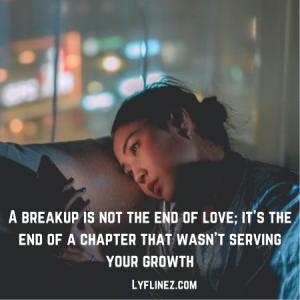Relationships and breakups can be a rollercoaster of emotions. When you’re in a relationship, it’s like riding the ups and downs together, sharing awesome moments, and even facing a few bumps in the road. But sometimes, those bumps can turn into full-on breakups. Breakups are like hitting a sudden stop on the relationship rollercoaster. They can be super tough and emotional, leaving you with a mix of feelings. In this article, We will go through types of breakups that get back together.
Sometimes, breakups are a chance for both people to grow and learn, and in some cases, they are likely to get back together stronger than ever. According to a research, Approximately 70% of breakups occur within the first year of a relationship.
So, whether you’re in the middle of a breakup or just thinking about it, remember that relationships and breakups are a natural part of the whole love journey. It’s all about finding what’s right for you, even if it means starting a new chapter after a tough breakup.
Breakups are often seen as the end of a romantic journey, but for some couples, they can also mark the beginning of a new chapter. Reconciliation after a breakup is not uncommon, and it can be a complex and emotional process.

Different Types Of Breakups
1- Amicable Breakup
This type of breakup often referred to as a friendly or mutual breakup, is a situation in which a romantic relationship ends on good terms with both partners involved maintaining a sense of respect, understanding, and often even friendship.
Unlike more contentious breakups marked by conflicts and bitterness, amicable breakups are characterized by a sense of cooperation and a commitment to part ways without causing undue emotional harm or distress to each other.
Amicable breakups, while generally smoother and less emotionally taxing, are not without their challenges. It can still be a difficult and emotional process, as the end of any meaningful relationship carries a sense of loss and adjustment.
However, the amicable approach focuses on minimizing harm and making the transition as smooth as possible for both individuals involved.
It is often a testament to the maturity and emotional intelligence of the parties, who choose to end a relationship on good terms, which can be beneficial for their future interactions and overall well-being.
2- Long-Distance Breakup
A long-distance breakup is a particularly challenging type of relationship ending in which the partners involved are geographically separated, making the breakup process even more complex and emotionally taxing. These breakups are characterized by distance as a significant factor in the decision to part ways.
Despite the difficulties and challenges, some long-distance relationships do thrive, and couples successfully maintain their connections.
In these cases, strong communication, trust, and a shared vision for the future are vital. However, when the distance becomes a significant impediment to the relationship, and the emotional toll is too high, a long-distance breakup may be a decision taken with the best interests of both partners in mind.
Coping with a long-distance breakup often involves navigating not only the emotional aspects of the end of the relationship but also the practical challenges of separating from someone who may be far away.
Seeking support from friends, family, and professional counselors can be valuable in dealing with the emotional aftermath of a long-distance breakup.
3- Temporary Breakup
A temporary breakup, also known as a break or break in a relationship, is a situation where a couple decides to take a break from their romantic involvement without completely ending the relationship.
These breaks are often characterized by a predetermined period during which the partners take time apart to reflect, reassess, and work on individual issues or concerns.
It’s important to note that not all temporary breakups lead to reconciliation, and they can sometimes lead to permanent separations.
The success of a temporary breakup depends on the willingness of both partners to actively work on the relationship and themselves during the break.
Effective communication and clear boundaries are crucial to ensuring that the break serves its intended purpose and helps make a well-informed decision about the relationship’s future.
The chances of couples getting back together are higher than any other breakup.

Types of Breakups That Get Back Together Successfully
Going through a breakup can be incredibly challenging, and it’s natural for you to want to find your way back to your ex and get your relationship back on track.
While it’s not always easy, with time, self-reflection, and effective communication, many people do find their way back to their ex-partner and successfully get their ex back.
It often involves addressing the issues that led to the breakup, rebuilding trust, and working on personal growth. Though every relationship is unique, your desire to reconnect and your willingness to make it work can be a strong driving force in bringing you two back together.
Here are the types of breakups that get back together successfully.
Mutual Breakups:
Sometimes, couples decide to part ways on good terms because they believe it’s the best thing for both of them. In such cases, the breakup is usually amicable, and there is a strong foundation of respect and understanding. Over time, as circumstances change or both partners mature, they might realize that they still care for each other and decide to give the relationship another shot.
Timing and Distance:
Life can be complicated, and often, the timing just isn’t right for a relationship. Long-distance relationships, for example, can face difficulties due to geographical separation. If the reason for the breakup is primarily related to timing or distance, couples may choose to reunite when these obstacles are no longer an issue.
Temporary Conflicts:
Many breakups occur due to temporary conflicts or misunderstandings. When both partners recognize that these issues are not fundamental to the relationship and can be resolved, they may decide to reconcile. Effective communication and conflict resolution skills play a crucial role in the success of such reunions.
Personal Growth:
People change and grow over time. Sometimes, a breakup can be a result of personal growth and the need to explore individual paths. In cases where both partners have had the opportunity to evolve and work on themselves, they may come back together with a deeper understanding of each other and a renewed commitment to the relationship.
Shared Values and Goals:
Couples who share common values and long-term goals often have a higher likelihood of getting back together successfully. Even after a breakup, if these fundamental aspects of the relationship remain intact, couples may find it compelling to reunite to pursue their shared dreams.
Continued Emotional Connection:
Some couples maintain a strong emotional connection even after a breakup. They might stay friends or keep in touch. If the emotional bond between them remains strong, it can act as a magnet, drawing them back into a romantic relationship.
External Factors:
Sometimes, external factors like family, friends, or societal pressure can influence a breakup. When these external pressures lessen or disappear, couples may reconsider their decision and choose to reconcile based on their own feelings and desires.
Professional Help and Counseling:
In some cases, couples seek professional help, such as couples counseling, to navigate their issues and conflicts. This therapeutic intervention can provide valuable insights and strategies for rebuilding the relationship, leading to a successful reunion.
It’s important to note that not all breakups result in successful reunions. Every relationship is unique, and the potential for getting back together depends on the specific circumstances and the willingness of both individuals to work on their issues. Successful reconciliations often require open communication, personal growth, and a genuine desire to make the relationship work and get your ex back.

Breakups That Have Limited Chances of Reconciliation
Breakups that have limited chances of reconciliation typically involve circumstances or dynamics that make it highly unlikely for the former partners to get back together successfully. While every relationship is unique, certain situations and factors reduce the probability of reconciliation significantly. Here are some examples:
Cheating and Betrayal:
If infidelity or a breach of trust played a significant role in the breakup, it can be very challenging to rebuild the trust necessary for a healthy relationship. Betrayal often leads to lasting hurt and resentment, making it difficult to reconcile.
Abuse and Toxic Relationships:
In situations of physical, emotional, or psychological abuse, it is generally inadvisable to attempt reconciliation. These relationships can be harmful, and seeking a fresh start or professional help is often a better option.
Fundamental Incompatibility:
Some relationships break up because of fundamental differences in values, life goals, or core beliefs. If these disparities are deep-seated and unresolvable, reconciliation is unlikely to be a healthy choice.
Repeated Breakups:
When a relationship experiences a pattern of multiple breakups and reunions, it may indicate underlying issues that make reconciliation challenging. Reconciliation without addressing these issues often leads to a cycle of instability.
One-sided Breakup:
In cases where one partner initiates the breakup unilaterally and the other party is not willing to end the relationship, it can be challenging to reconcile if the person who initiated the breakup remains steadfast in their decision.
Long-standing Resentment:
If there is a history of unresolved conflicts, resentment, or unresolved issues within the relationship, these factors can hinder reconciliation efforts. Lingering negative emotions can make it difficult to rekindle the romance.
External Factors:
Sometimes, external circumstances, such as interference from family or friends, may create barriers to reconciliation. Even if both individuals want to reconcile, external pressures can complicate the process.
Life Changes:
Significant changes in individual life circumstances, such as moving to a different city, starting a new job, or embarking on a different life path, can make it impractical to get back together, even if both parties desire it.
Lack of Mutual Interest:
For reconciliation to be successful, both partners must be genuinely interested in rekindling the relationship. If one or both parties have moved on emotionally or no longer have a desire to be together, the chances of reconciliation are limited.
It’s important to recognize that while reconciliation may not be feasible or advisable in these scenarios, it doesn’t mean that personal growth, healing, and positive future relationships are out of reach. Sometimes, the best course of action is to focus on individual well-being and moving forward in life independently or with new partners who align better with one’s values and goals.

Factors That Influence Getting Back Together A Break-Up
The decision to get back together after a breakup is influenced by a variety of factors, both personal and relational. These factors can significantly impact the chances of a successful reconciliation. Here are some key considerations that influence the possibility of getting back together after a breakup:
Mutual Desire:
The desire to reconcile must be mutual. If only one partner wants to get back together while the other doesn’t, it can lead to a one-sided effort, which is unlikely to result in a healthy relationship. Both partners need to genuinely want to give the relationship another chance.
Reasons for the Breakup:
Understanding why the breakup occurred is crucial. If it was due to issues that are fixable or temporary, like conflicts over a specific situation, misunderstandings, or external stressors, the chances of getting back together successfully increase. Identifying these reasons and working on solutions is essential.
Time Apart:
The duration of the separation matters. Taking time apart can provide clarity and emotional healing. It allows individuals to assess their feelings and determine if they truly miss the relationship. However, too much time apart can create emotional distance, so striking the right balance is key.
Personal Growth:
Personal growth and self-improvement during the separation can be a significant factor. Both partners should take the time to reflect on their own behavior, communication skills, and personal issues that may have contributed to the breakup. This introspection can lead to positive changes that benefit the relationship.
Effective Communication:
Successful reconciliation often hinges on the ability to communicate openly and honestly. Both partners should be willing to discuss the problems that led to the breakup, their feelings, and what they need from each other in the future. Effective communication can help rebuild trust and understanding.
Change in Circumstances:
Changes in life circumstances can create opportunities for reconciliation. For example, if one partner relocates closer to the other, it can make maintaining the relationship more feasible. New job opportunities or adjustments in personal goals may also align more favorably with reconciliation.
Commitment and Effort:
The commitment and effort put into making the relationship work post-breakup are essential. Both partners should be committed to addressing past issues, making changes, and working together to rebuild the relationship. It’s not just about getting back together but also about making it better.
Support Systems:
Friends and family can influence the decision to reconcile. A supportive network can provide valuable guidance and encouragement, but it can also raise concerns that need to be addressed. Seeking input from trusted individuals can help in the decision-making process.
Trust and Forgiveness:
Rebuilding trust, especially after issues like infidelity or betrayal, is a challenging but necessary step. Both partners should be open to forgiving and moving forward. A commitment to creating a healthier, more trusting relationship is paramount.
Shared Goals and Values:
Partners who share common goals and values are more likely to successfully reunite. Having a strong foundation of shared beliefs, long-term aspirations, and a sense of mutual purpose can make the idea of reconciliation more appealing.
Relationship History:
The history of the relationship plays a significant role. A positive and meaningful history, with shared experiences and happy memories, can serve as a compelling reason to give the relationship another chance. Partners may be reluctant to let go of something that holds so much significance in their lives.
External Factors:
External pressures, such as the expectations of family or societal norms, can have an impact on the decision to get back together. In some cases, the support of family and friends can encourage reconciliation, while in others, external pressures may dissuade it.
In the end, the decision to get back together after a breakup should be made with careful consideration and mutual understanding. Both partners must be on the same page, willing to work together, and actively address the issues that led to the breakup in the first place. Seeking professional guidance from a therapist or counselor can be beneficial in navigating the process and ensuring that the reconciliation effort is based on healthy communication and mutual growth.
Tips for Successfully Getting Back Together Your Breakup
Getting back together after a breakup can be a complex process for you and your partner. To increase the chances of success, mutual desire is crucial; both of you must genuinely want to rekindle the relationship.
Open and honest communication is vital to discuss the reasons behind the breakup, your feelings, and the changes you both want to make. Addressing the root causes of the breakup is essential, which may involve personal growth, improved communication, and conflict resolution.
Having realistic expectations is important; remember that the relationship won’t instantly return to its previous state.
It’s also crucial to forgive and let go of past grievances, as holding onto grudges can hinder the reconciliation process. Personal growth should be a focus for both of you, including working on emotional intelligence, and self-awareness, and addressing any personal issues that may have affected the relationship.
Spending quality time together is crucial to rebuilding emotional closeness and strengthening your bond. Rebuilding trust, especially if it was broken, takes time and patience. Consulting a relationship counselor or therapist can provide valuable insights and strategies for both of you.
Maintaining your individual identities and interests is essential, as a healthy relationship should complement your personal lives without consuming them.
Take the reconciliation process slowly to allow both of you to heal, rebuild trust, and adjust to changes made in the relationship.
Reevaluating and establishing new boundaries and expectations is an opportunity to create a healthier dynamic. Seeking support from friends and family, especially those who offer constructive advice, can be beneficial.
Honor any commitments or agreements made during the reconciliation process to demonstrate dedication to the relationship. Periodically assess the progress of the relationship through open discussions to make any necessary adjustments.
Let everything behind you and look forward to the future together…..
Reflect on the past and learn from your mistakes, identifying what led to the breakup and taking proactive steps to avoid repeating the same patterns.
Patience is vital, as healing and rebuilding a relationship takes time. Consider compatibility and whether your long-term goals align.
Accepting each other’s imperfections is essential, as no relationship is perfect. Finally, stay committed, as reconciliation requires an ongoing effort from both of you to ensure its success.
Keep in mind that not all relationships can or should be reconciled; sometimes, it’s healthier for both individuals to move on separately.
The decision to get back together should be based on mutual understanding and a shared commitment to building a healthier, more fulfilling relationship.
Must Read
- Emotionally Unavailable Men- Signs And How To Deal With It
- Love Hate Relationship-8 clear signs of love-hate relationship
- I hate my wife-8 Big reasons why husbands hate their wives
- Giving Up On Love-Complete Guide On How To Save Your Love
Conclusion
Successfully getting back together after a breakup is a complex and emotionally charged journey. It hinges on mutual desire, open communication, and a commitment to addressing the root causes of the breakup. Realistic expectations, forgiveness, and personal growth play significant roles, as does rebuilding trust and seeking professional guidance when necessary.
Reconnecting with quality time, reevaluating boundaries, and accepting imperfections are also crucial. Patience is key throughout the process, and it’s essential to consider compatibility and shared long-term goals. Ultimately, staying committed to the relationship and ongoing efforts are vital for a successful reconciliation.
However, it’s important to recognize that not all relationships may reconciled. Sometimes, the best path forward is for both individuals to move on separately. The decision to get back together should be made with mutual understanding and a shared commitment to building a healthier, more fulfilling relationship.
